Conceivability Argument and Dualism: Evaluating Descartes' Theory
VerifiedAdded on 2022/08/15
|10
|2581
|17
Essay
AI Summary
This essay provides a comprehensive examination of the conceivability argument and its relationship to dualism, primarily focusing on the philosophical ideas of René Descartes. It begins by defining dualism as the separation of mind and body, presenting the core tenets of the conceivability argument, and exploring its premises. The essay delves into Descartes' Sixth Meditation, highlighting the argument's structure and key concepts. It then explores the concept of skepticism and its role in understanding dualism, along with the zombie argument. Furthermore, the essay critically analyzes the argument, discussing its strengths and weaknesses, and considers counterarguments and alternative perspectives. The essay incorporates the views of philosophers like Chalmers, Dennett, and Papineau, and concludes with a synthesis of the argument's validity and implications for understanding the mind-body problem. The essay also addresses the philosophical issues related to the argument and its premises.
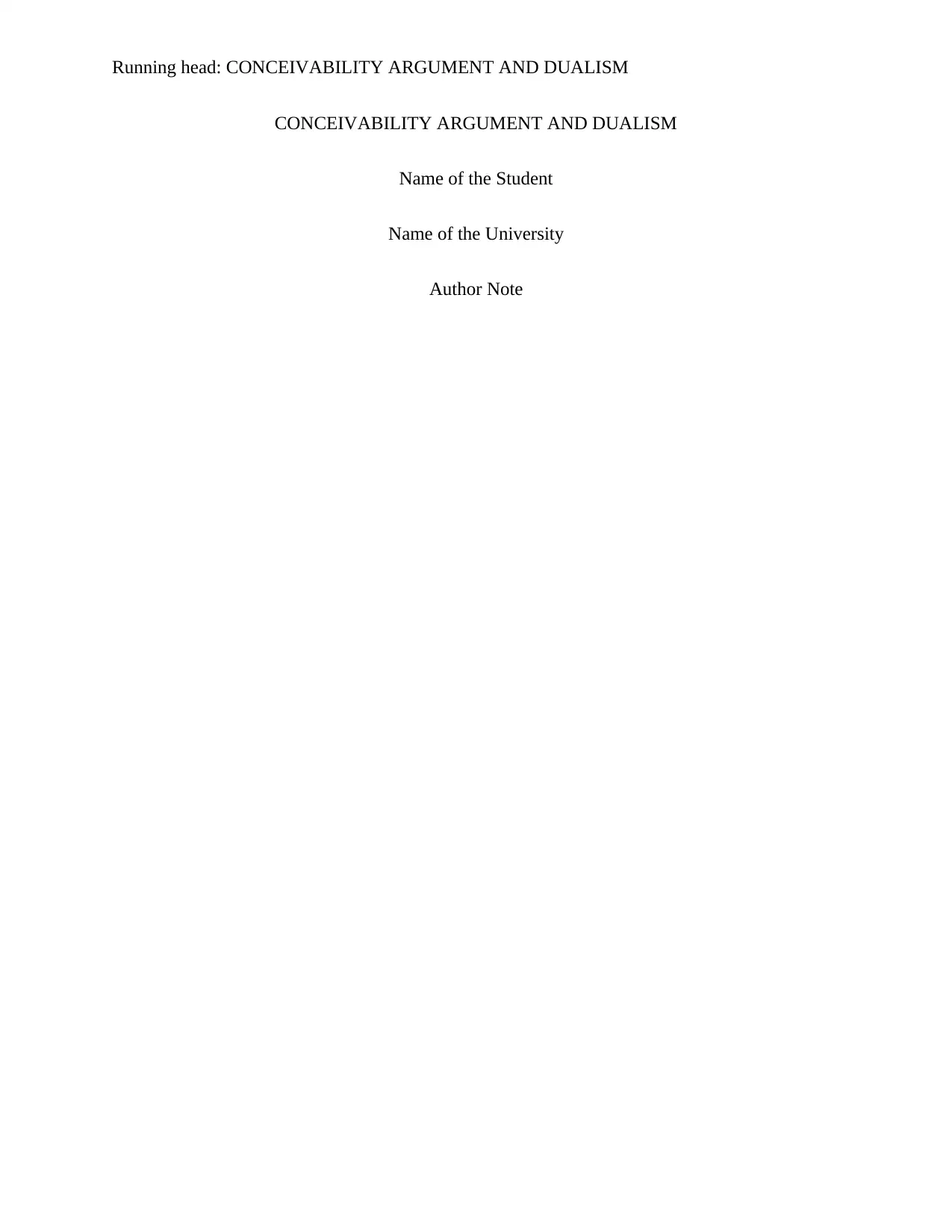
Running head: CONCEIVABILITY ARGUMENT AND DUALISM
CONCEIVABILITY ARGUMENT AND DUALISM
Name of the Student
Name of the University
Author Note
CONCEIVABILITY ARGUMENT AND DUALISM
Name of the Student
Name of the University
Author Note
Paraphrase This Document
Need a fresh take? Get an instant paraphrase of this document with our AI Paraphraser
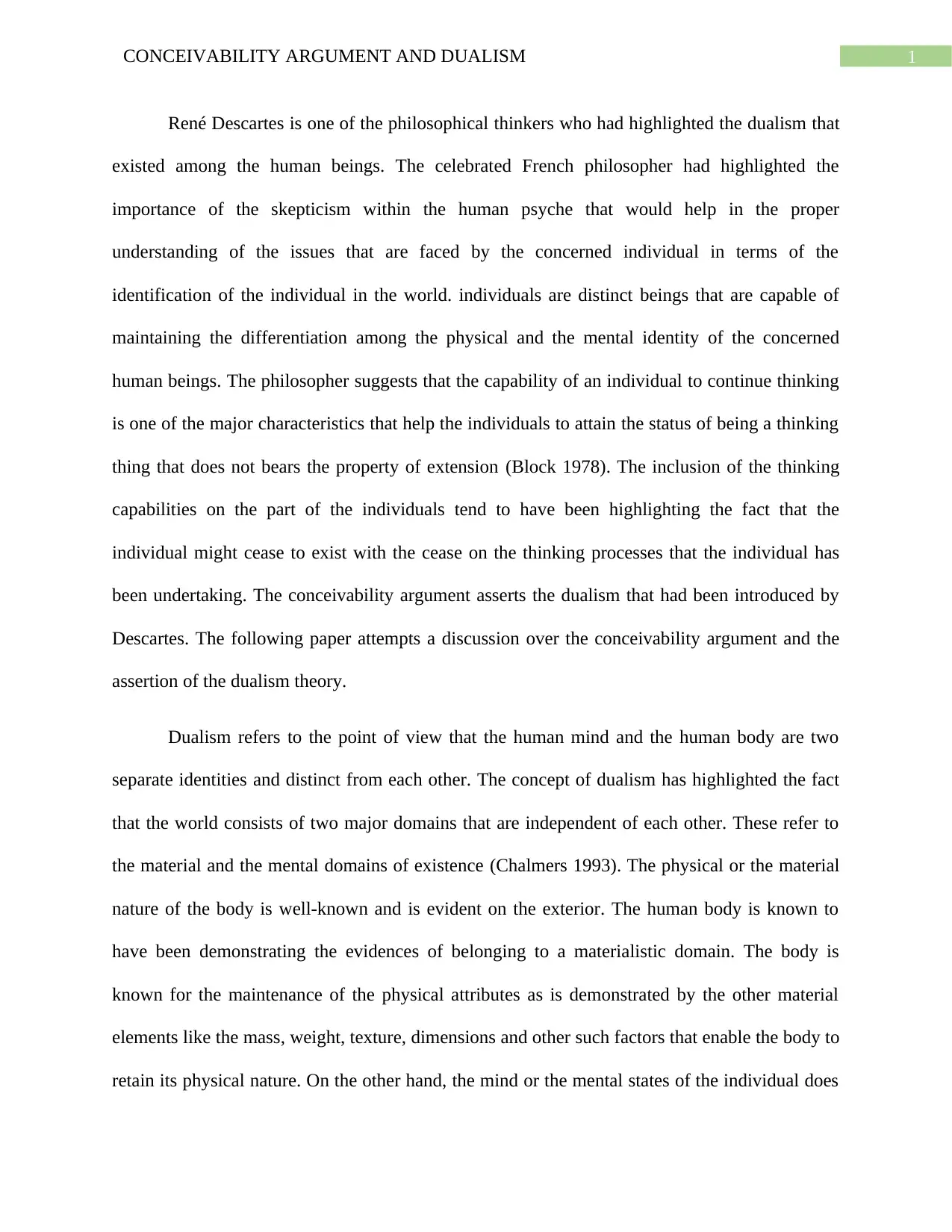
1CONCEIVABILITY ARGUMENT AND DUALISM
René Descartes is one of the philosophical thinkers who had highlighted the dualism that
existed among the human beings. The celebrated French philosopher had highlighted the
importance of the skepticism within the human psyche that would help in the proper
understanding of the issues that are faced by the concerned individual in terms of the
identification of the individual in the world. individuals are distinct beings that are capable of
maintaining the differentiation among the physical and the mental identity of the concerned
human beings. The philosopher suggests that the capability of an individual to continue thinking
is one of the major characteristics that help the individuals to attain the status of being a thinking
thing that does not bears the property of extension (Block 1978). The inclusion of the thinking
capabilities on the part of the individuals tend to have been highlighting the fact that the
individual might cease to exist with the cease on the thinking processes that the individual has
been undertaking. The conceivability argument asserts the dualism that had been introduced by
Descartes. The following paper attempts a discussion over the conceivability argument and the
assertion of the dualism theory.
Dualism refers to the point of view that the human mind and the human body are two
separate identities and distinct from each other. The concept of dualism has highlighted the fact
that the world consists of two major domains that are independent of each other. These refer to
the material and the mental domains of existence (Chalmers 1993). The physical or the material
nature of the body is well-known and is evident on the exterior. The human body is known to
have been demonstrating the evidences of belonging to a materialistic domain. The body is
known for the maintenance of the physical attributes as is demonstrated by the other material
elements like the mass, weight, texture, dimensions and other such factors that enable the body to
retain its physical nature. On the other hand, the mind or the mental states of the individual does
René Descartes is one of the philosophical thinkers who had highlighted the dualism that
existed among the human beings. The celebrated French philosopher had highlighted the
importance of the skepticism within the human psyche that would help in the proper
understanding of the issues that are faced by the concerned individual in terms of the
identification of the individual in the world. individuals are distinct beings that are capable of
maintaining the differentiation among the physical and the mental identity of the concerned
human beings. The philosopher suggests that the capability of an individual to continue thinking
is one of the major characteristics that help the individuals to attain the status of being a thinking
thing that does not bears the property of extension (Block 1978). The inclusion of the thinking
capabilities on the part of the individuals tend to have been highlighting the fact that the
individual might cease to exist with the cease on the thinking processes that the individual has
been undertaking. The conceivability argument asserts the dualism that had been introduced by
Descartes. The following paper attempts a discussion over the conceivability argument and the
assertion of the dualism theory.
Dualism refers to the point of view that the human mind and the human body are two
separate identities and distinct from each other. The concept of dualism has highlighted the fact
that the world consists of two major domains that are independent of each other. These refer to
the material and the mental domains of existence (Chalmers 1993). The physical or the material
nature of the body is well-known and is evident on the exterior. The human body is known to
have been demonstrating the evidences of belonging to a materialistic domain. The body is
known for the maintenance of the physical attributes as is demonstrated by the other material
elements like the mass, weight, texture, dimensions and other such factors that enable the body to
retain its physical nature. On the other hand, the mind or the mental states of the individual does
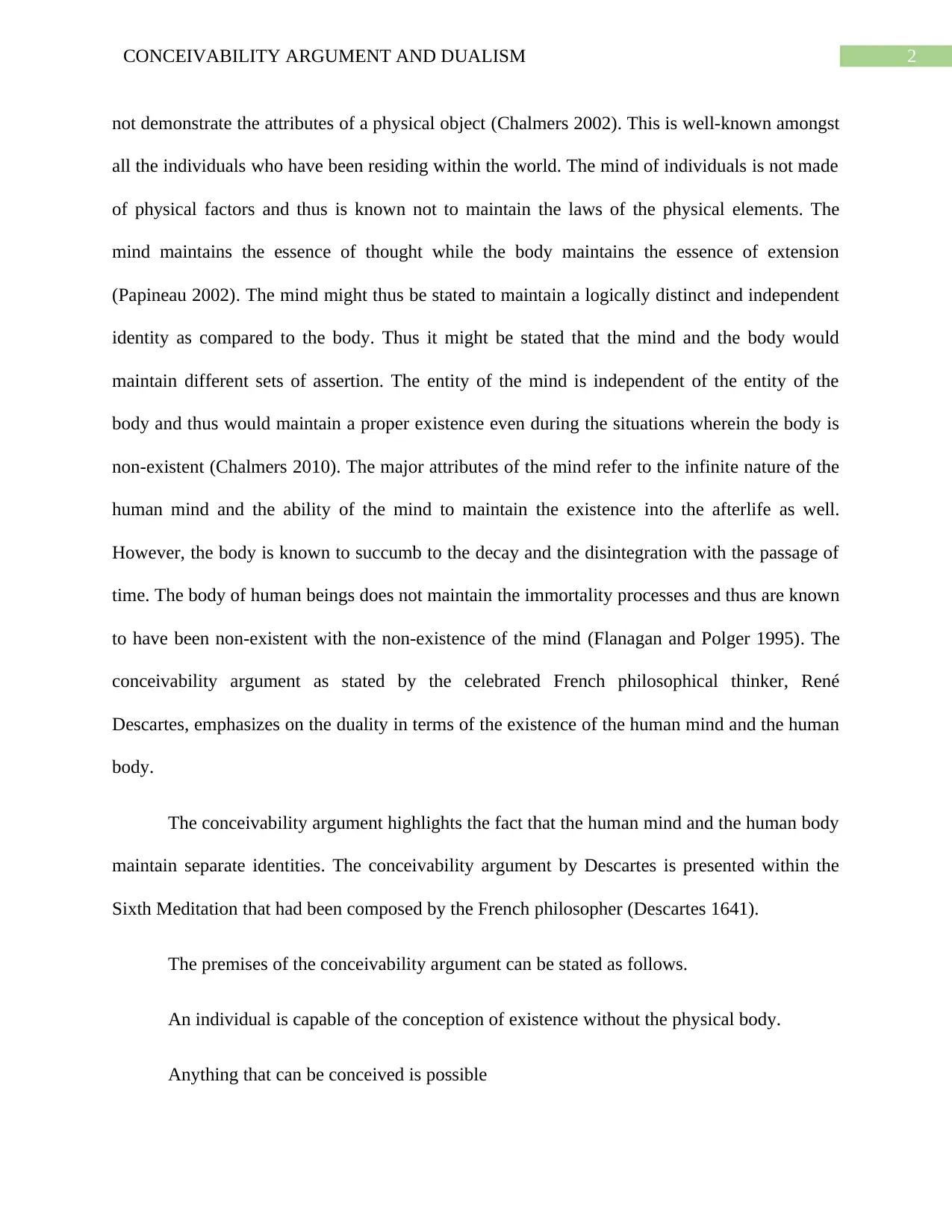
2CONCEIVABILITY ARGUMENT AND DUALISM
not demonstrate the attributes of a physical object (Chalmers 2002). This is well-known amongst
all the individuals who have been residing within the world. The mind of individuals is not made
of physical factors and thus is known not to maintain the laws of the physical elements. The
mind maintains the essence of thought while the body maintains the essence of extension
(Papineau 2002). The mind might thus be stated to maintain a logically distinct and independent
identity as compared to the body. Thus it might be stated that the mind and the body would
maintain different sets of assertion. The entity of the mind is independent of the entity of the
body and thus would maintain a proper existence even during the situations wherein the body is
non-existent (Chalmers 2010). The major attributes of the mind refer to the infinite nature of the
human mind and the ability of the mind to maintain the existence into the afterlife as well.
However, the body is known to succumb to the decay and the disintegration with the passage of
time. The body of human beings does not maintain the immortality processes and thus are known
to have been non-existent with the non-existence of the mind (Flanagan and Polger 1995). The
conceivability argument as stated by the celebrated French philosophical thinker, René
Descartes, emphasizes on the duality in terms of the existence of the human mind and the human
body.
The conceivability argument highlights the fact that the human mind and the human body
maintain separate identities. The conceivability argument by Descartes is presented within the
Sixth Meditation that had been composed by the French philosopher (Descartes 1641).
The premises of the conceivability argument can be stated as follows.
An individual is capable of the conception of existence without the physical body.
Anything that can be conceived is possible
not demonstrate the attributes of a physical object (Chalmers 2002). This is well-known amongst
all the individuals who have been residing within the world. The mind of individuals is not made
of physical factors and thus is known not to maintain the laws of the physical elements. The
mind maintains the essence of thought while the body maintains the essence of extension
(Papineau 2002). The mind might thus be stated to maintain a logically distinct and independent
identity as compared to the body. Thus it might be stated that the mind and the body would
maintain different sets of assertion. The entity of the mind is independent of the entity of the
body and thus would maintain a proper existence even during the situations wherein the body is
non-existent (Chalmers 2010). The major attributes of the mind refer to the infinite nature of the
human mind and the ability of the mind to maintain the existence into the afterlife as well.
However, the body is known to succumb to the decay and the disintegration with the passage of
time. The body of human beings does not maintain the immortality processes and thus are known
to have been non-existent with the non-existence of the mind (Flanagan and Polger 1995). The
conceivability argument as stated by the celebrated French philosophical thinker, René
Descartes, emphasizes on the duality in terms of the existence of the human mind and the human
body.
The conceivability argument highlights the fact that the human mind and the human body
maintain separate identities. The conceivability argument by Descartes is presented within the
Sixth Meditation that had been composed by the French philosopher (Descartes 1641).
The premises of the conceivability argument can be stated as follows.
An individual is capable of the conception of existence without the physical body.
Anything that can be conceived is possible
⊘ This is a preview!⊘
Do you want full access?
Subscribe today to unlock all pages.

Trusted by 1+ million students worldwide
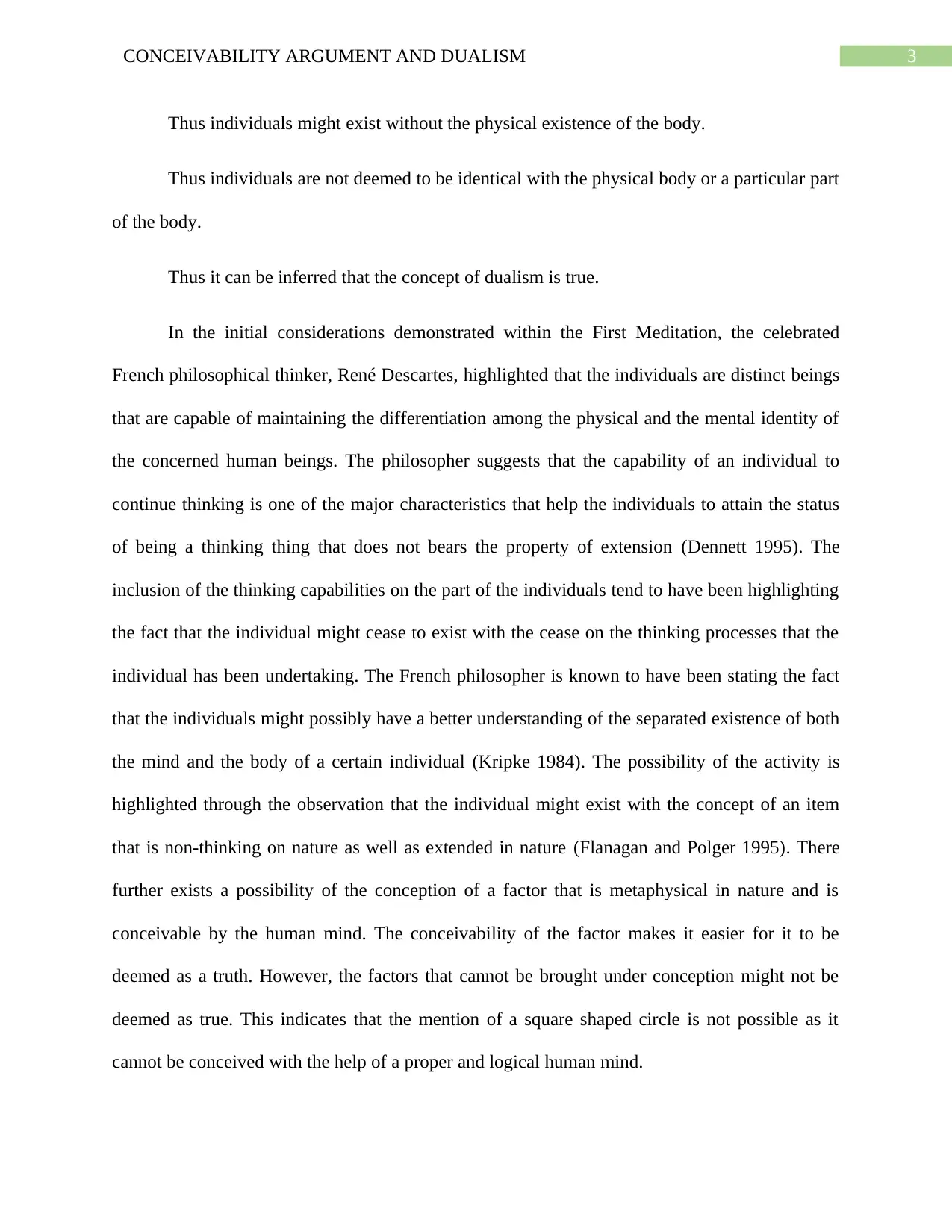
3CONCEIVABILITY ARGUMENT AND DUALISM
Thus individuals might exist without the physical existence of the body.
Thus individuals are not deemed to be identical with the physical body or a particular part
of the body.
Thus it can be inferred that the concept of dualism is true.
In the initial considerations demonstrated within the First Meditation, the celebrated
French philosophical thinker, René Descartes, highlighted that the individuals are distinct beings
that are capable of maintaining the differentiation among the physical and the mental identity of
the concerned human beings. The philosopher suggests that the capability of an individual to
continue thinking is one of the major characteristics that help the individuals to attain the status
of being a thinking thing that does not bears the property of extension (Dennett 1995). The
inclusion of the thinking capabilities on the part of the individuals tend to have been highlighting
the fact that the individual might cease to exist with the cease on the thinking processes that the
individual has been undertaking. The French philosopher is known to have been stating the fact
that the individuals might possibly have a better understanding of the separated existence of both
the mind and the body of a certain individual (Kripke 1984). The possibility of the activity is
highlighted through the observation that the individual might exist with the concept of an item
that is non-thinking on nature as well as extended in nature (Flanagan and Polger 1995). There
further exists a possibility of the conception of a factor that is metaphysical in nature and is
conceivable by the human mind. The conceivability of the factor makes it easier for it to be
deemed as a truth. However, the factors that cannot be brought under conception might not be
deemed as true. This indicates that the mention of a square shaped circle is not possible as it
cannot be conceived with the help of a proper and logical human mind.
Thus individuals might exist without the physical existence of the body.
Thus individuals are not deemed to be identical with the physical body or a particular part
of the body.
Thus it can be inferred that the concept of dualism is true.
In the initial considerations demonstrated within the First Meditation, the celebrated
French philosophical thinker, René Descartes, highlighted that the individuals are distinct beings
that are capable of maintaining the differentiation among the physical and the mental identity of
the concerned human beings. The philosopher suggests that the capability of an individual to
continue thinking is one of the major characteristics that help the individuals to attain the status
of being a thinking thing that does not bears the property of extension (Dennett 1995). The
inclusion of the thinking capabilities on the part of the individuals tend to have been highlighting
the fact that the individual might cease to exist with the cease on the thinking processes that the
individual has been undertaking. The French philosopher is known to have been stating the fact
that the individuals might possibly have a better understanding of the separated existence of both
the mind and the body of a certain individual (Kripke 1984). The possibility of the activity is
highlighted through the observation that the individual might exist with the concept of an item
that is non-thinking on nature as well as extended in nature (Flanagan and Polger 1995). There
further exists a possibility of the conception of a factor that is metaphysical in nature and is
conceivable by the human mind. The conceivability of the factor makes it easier for it to be
deemed as a truth. However, the factors that cannot be brought under conception might not be
deemed as true. This indicates that the mention of a square shaped circle is not possible as it
cannot be conceived with the help of a proper and logical human mind.
Paraphrase This Document
Need a fresh take? Get an instant paraphrase of this document with our AI Paraphraser
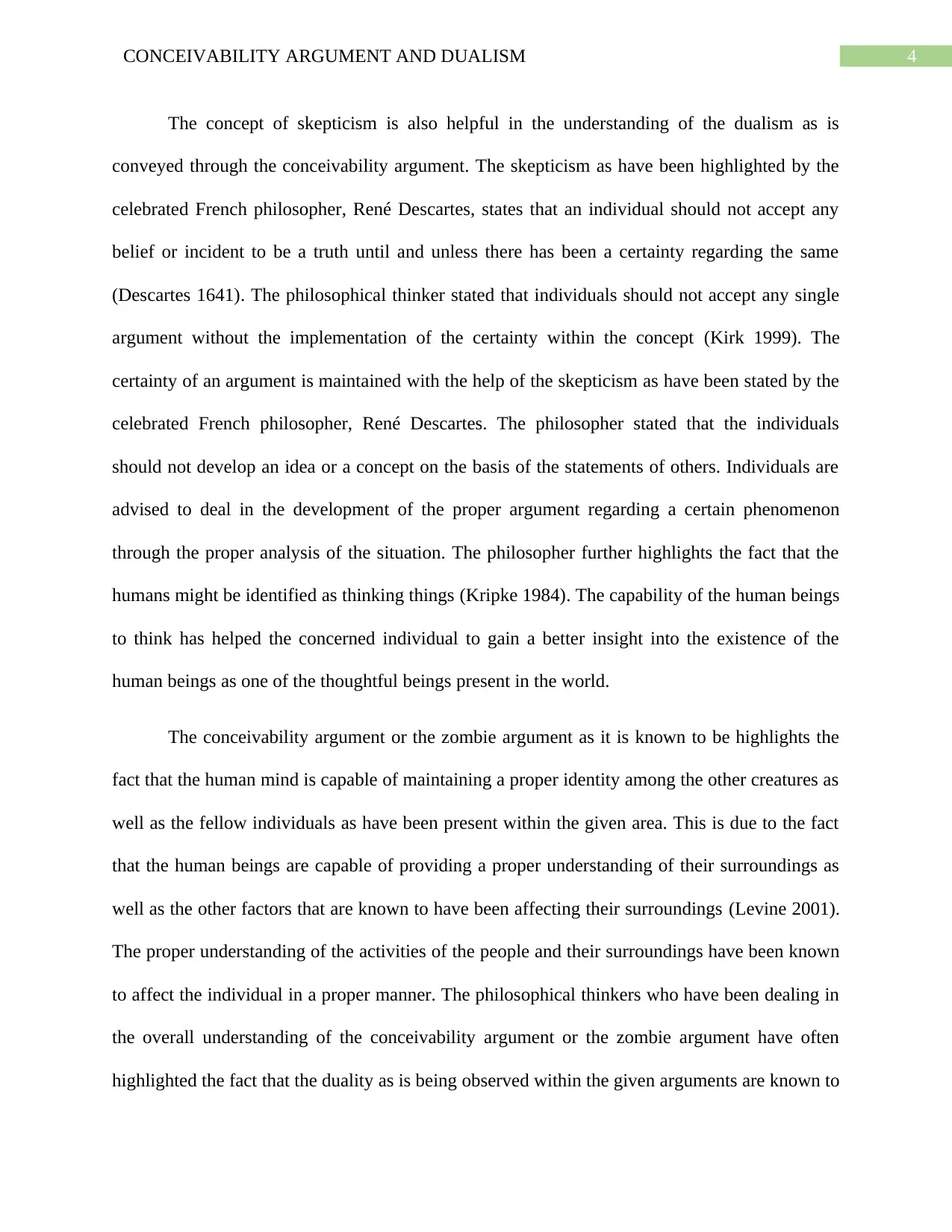
4CONCEIVABILITY ARGUMENT AND DUALISM
The concept of skepticism is also helpful in the understanding of the dualism as is
conveyed through the conceivability argument. The skepticism as have been highlighted by the
celebrated French philosopher, René Descartes, states that an individual should not accept any
belief or incident to be a truth until and unless there has been a certainty regarding the same
(Descartes 1641). The philosophical thinker stated that individuals should not accept any single
argument without the implementation of the certainty within the concept (Kirk 1999). The
certainty of an argument is maintained with the help of the skepticism as have been stated by the
celebrated French philosopher, René Descartes. The philosopher stated that the individuals
should not develop an idea or a concept on the basis of the statements of others. Individuals are
advised to deal in the development of the proper argument regarding a certain phenomenon
through the proper analysis of the situation. The philosopher further highlights the fact that the
humans might be identified as thinking things (Kripke 1984). The capability of the human beings
to think has helped the concerned individual to gain a better insight into the existence of the
human beings as one of the thoughtful beings present in the world.
The conceivability argument or the zombie argument as it is known to be highlights the
fact that the human mind is capable of maintaining a proper identity among the other creatures as
well as the fellow individuals as have been present within the given area. This is due to the fact
that the human beings are capable of providing a proper understanding of their surroundings as
well as the other factors that are known to have been affecting their surroundings (Levine 2001).
The proper understanding of the activities of the people and their surroundings have been known
to affect the individual in a proper manner. The philosophical thinkers who have been dealing in
the overall understanding of the conceivability argument or the zombie argument have often
highlighted the fact that the duality as is being observed within the given arguments are known to
The concept of skepticism is also helpful in the understanding of the dualism as is
conveyed through the conceivability argument. The skepticism as have been highlighted by the
celebrated French philosopher, René Descartes, states that an individual should not accept any
belief or incident to be a truth until and unless there has been a certainty regarding the same
(Descartes 1641). The philosophical thinker stated that individuals should not accept any single
argument without the implementation of the certainty within the concept (Kirk 1999). The
certainty of an argument is maintained with the help of the skepticism as have been stated by the
celebrated French philosopher, René Descartes. The philosopher stated that the individuals
should not develop an idea or a concept on the basis of the statements of others. Individuals are
advised to deal in the development of the proper argument regarding a certain phenomenon
through the proper analysis of the situation. The philosopher further highlights the fact that the
humans might be identified as thinking things (Kripke 1984). The capability of the human beings
to think has helped the concerned individual to gain a better insight into the existence of the
human beings as one of the thoughtful beings present in the world.
The conceivability argument or the zombie argument as it is known to be highlights the
fact that the human mind is capable of maintaining a proper identity among the other creatures as
well as the fellow individuals as have been present within the given area. This is due to the fact
that the human beings are capable of providing a proper understanding of their surroundings as
well as the other factors that are known to have been affecting their surroundings (Levine 2001).
The proper understanding of the activities of the people and their surroundings have been known
to affect the individual in a proper manner. The philosophical thinkers who have been dealing in
the overall understanding of the conceivability argument or the zombie argument have often
highlighted the fact that the duality as is being observed within the given arguments are known to
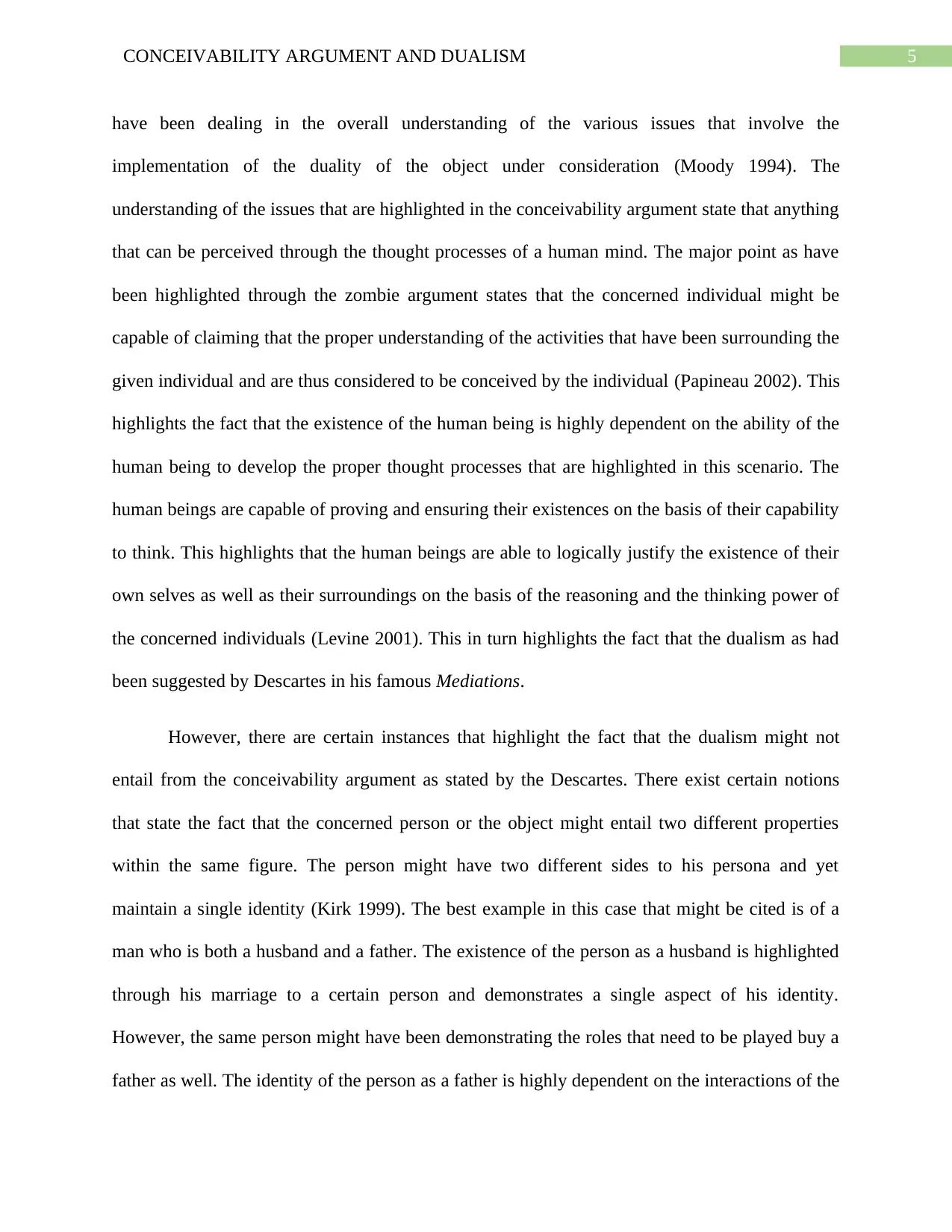
5CONCEIVABILITY ARGUMENT AND DUALISM
have been dealing in the overall understanding of the various issues that involve the
implementation of the duality of the object under consideration (Moody 1994). The
understanding of the issues that are highlighted in the conceivability argument state that anything
that can be perceived through the thought processes of a human mind. The major point as have
been highlighted through the zombie argument states that the concerned individual might be
capable of claiming that the proper understanding of the activities that have been surrounding the
given individual and are thus considered to be conceived by the individual (Papineau 2002). This
highlights the fact that the existence of the human being is highly dependent on the ability of the
human being to develop the proper thought processes that are highlighted in this scenario. The
human beings are capable of proving and ensuring their existences on the basis of their capability
to think. This highlights that the human beings are able to logically justify the existence of their
own selves as well as their surroundings on the basis of the reasoning and the thinking power of
the concerned individuals (Levine 2001). This in turn highlights the fact that the dualism as had
been suggested by Descartes in his famous Mediations.
However, there are certain instances that highlight the fact that the dualism might not
entail from the conceivability argument as stated by the Descartes. There exist certain notions
that state the fact that the concerned person or the object might entail two different properties
within the same figure. The person might have two different sides to his persona and yet
maintain a single identity (Kirk 1999). The best example in this case that might be cited is of a
man who is both a husband and a father. The existence of the person as a husband is highlighted
through his marriage to a certain person and demonstrates a single aspect of his identity.
However, the same person might have been demonstrating the roles that need to be played buy a
father as well. The identity of the person as a father is highly dependent on the interactions of the
have been dealing in the overall understanding of the various issues that involve the
implementation of the duality of the object under consideration (Moody 1994). The
understanding of the issues that are highlighted in the conceivability argument state that anything
that can be perceived through the thought processes of a human mind. The major point as have
been highlighted through the zombie argument states that the concerned individual might be
capable of claiming that the proper understanding of the activities that have been surrounding the
given individual and are thus considered to be conceived by the individual (Papineau 2002). This
highlights the fact that the existence of the human being is highly dependent on the ability of the
human being to develop the proper thought processes that are highlighted in this scenario. The
human beings are capable of proving and ensuring their existences on the basis of their capability
to think. This highlights that the human beings are able to logically justify the existence of their
own selves as well as their surroundings on the basis of the reasoning and the thinking power of
the concerned individuals (Levine 2001). This in turn highlights the fact that the dualism as had
been suggested by Descartes in his famous Mediations.
However, there are certain instances that highlight the fact that the dualism might not
entail from the conceivability argument as stated by the Descartes. There exist certain notions
that state the fact that the concerned person or the object might entail two different properties
within the same figure. The person might have two different sides to his persona and yet
maintain a single identity (Kirk 1999). The best example in this case that might be cited is of a
man who is both a husband and a father. The existence of the person as a husband is highlighted
through his marriage to a certain person and demonstrates a single aspect of his identity.
However, the same person might have been demonstrating the roles that need to be played buy a
father as well. The identity of the person as a father is highly dependent on the interactions of the
⊘ This is a preview!⊘
Do you want full access?
Subscribe today to unlock all pages.

Trusted by 1+ million students worldwide
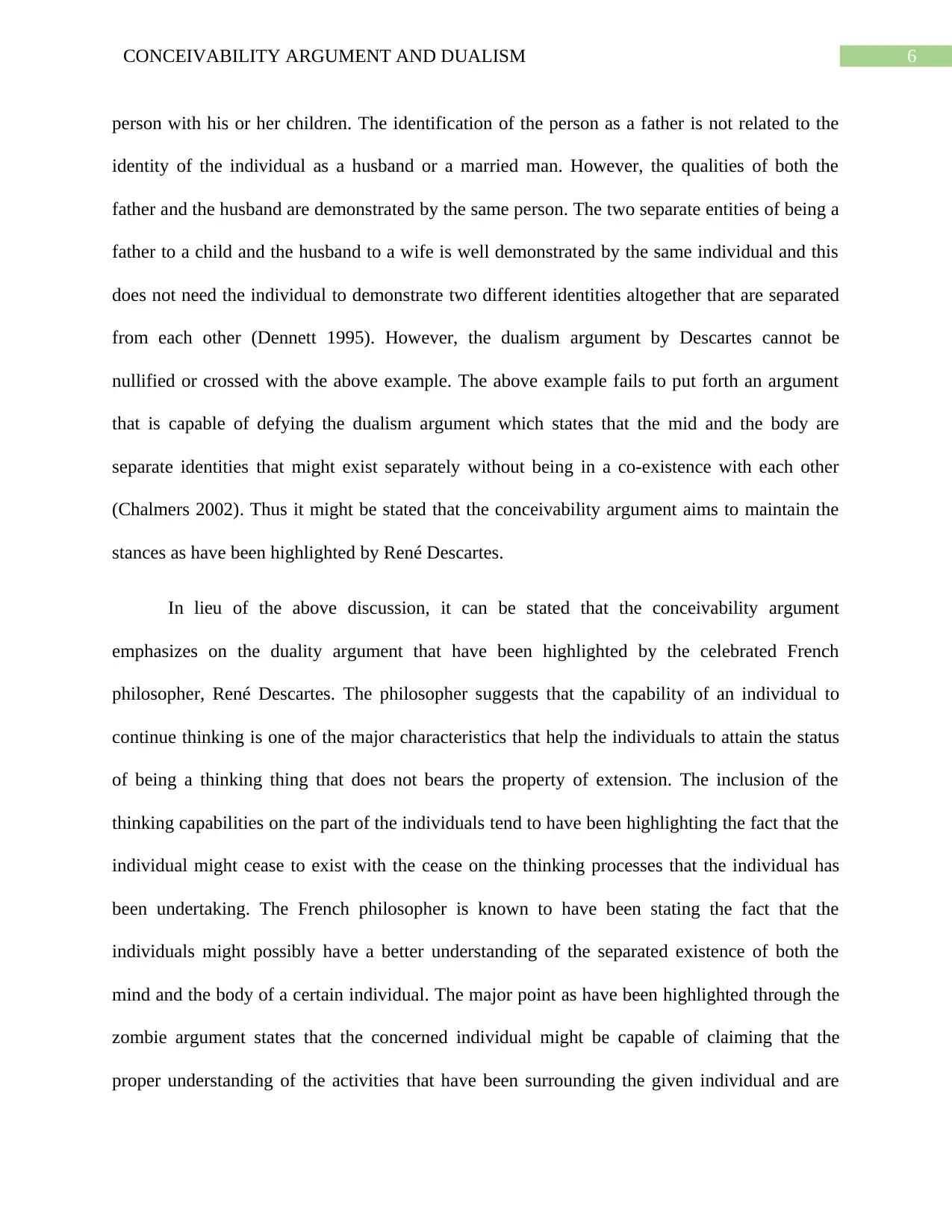
6CONCEIVABILITY ARGUMENT AND DUALISM
person with his or her children. The identification of the person as a father is not related to the
identity of the individual as a husband or a married man. However, the qualities of both the
father and the husband are demonstrated by the same person. The two separate entities of being a
father to a child and the husband to a wife is well demonstrated by the same individual and this
does not need the individual to demonstrate two different identities altogether that are separated
from each other (Dennett 1995). However, the dualism argument by Descartes cannot be
nullified or crossed with the above example. The above example fails to put forth an argument
that is capable of defying the dualism argument which states that the mid and the body are
separate identities that might exist separately without being in a co-existence with each other
(Chalmers 2002). Thus it might be stated that the conceivability argument aims to maintain the
stances as have been highlighted by René Descartes.
In lieu of the above discussion, it can be stated that the conceivability argument
emphasizes on the duality argument that have been highlighted by the celebrated French
philosopher, René Descartes. The philosopher suggests that the capability of an individual to
continue thinking is one of the major characteristics that help the individuals to attain the status
of being a thinking thing that does not bears the property of extension. The inclusion of the
thinking capabilities on the part of the individuals tend to have been highlighting the fact that the
individual might cease to exist with the cease on the thinking processes that the individual has
been undertaking. The French philosopher is known to have been stating the fact that the
individuals might possibly have a better understanding of the separated existence of both the
mind and the body of a certain individual. The major point as have been highlighted through the
zombie argument states that the concerned individual might be capable of claiming that the
proper understanding of the activities that have been surrounding the given individual and are
person with his or her children. The identification of the person as a father is not related to the
identity of the individual as a husband or a married man. However, the qualities of both the
father and the husband are demonstrated by the same person. The two separate entities of being a
father to a child and the husband to a wife is well demonstrated by the same individual and this
does not need the individual to demonstrate two different identities altogether that are separated
from each other (Dennett 1995). However, the dualism argument by Descartes cannot be
nullified or crossed with the above example. The above example fails to put forth an argument
that is capable of defying the dualism argument which states that the mid and the body are
separate identities that might exist separately without being in a co-existence with each other
(Chalmers 2002). Thus it might be stated that the conceivability argument aims to maintain the
stances as have been highlighted by René Descartes.
In lieu of the above discussion, it can be stated that the conceivability argument
emphasizes on the duality argument that have been highlighted by the celebrated French
philosopher, René Descartes. The philosopher suggests that the capability of an individual to
continue thinking is one of the major characteristics that help the individuals to attain the status
of being a thinking thing that does not bears the property of extension. The inclusion of the
thinking capabilities on the part of the individuals tend to have been highlighting the fact that the
individual might cease to exist with the cease on the thinking processes that the individual has
been undertaking. The French philosopher is known to have been stating the fact that the
individuals might possibly have a better understanding of the separated existence of both the
mind and the body of a certain individual. The major point as have been highlighted through the
zombie argument states that the concerned individual might be capable of claiming that the
proper understanding of the activities that have been surrounding the given individual and are
Paraphrase This Document
Need a fresh take? Get an instant paraphrase of this document with our AI Paraphraser

7CONCEIVABILITY ARGUMENT AND DUALISM
thus considered to be conceived by the individual. Thus, the theory of dualism is observed to
have been holding true till the present times as well.
thus considered to be conceived by the individual. Thus, the theory of dualism is observed to
have been holding true till the present times as well.
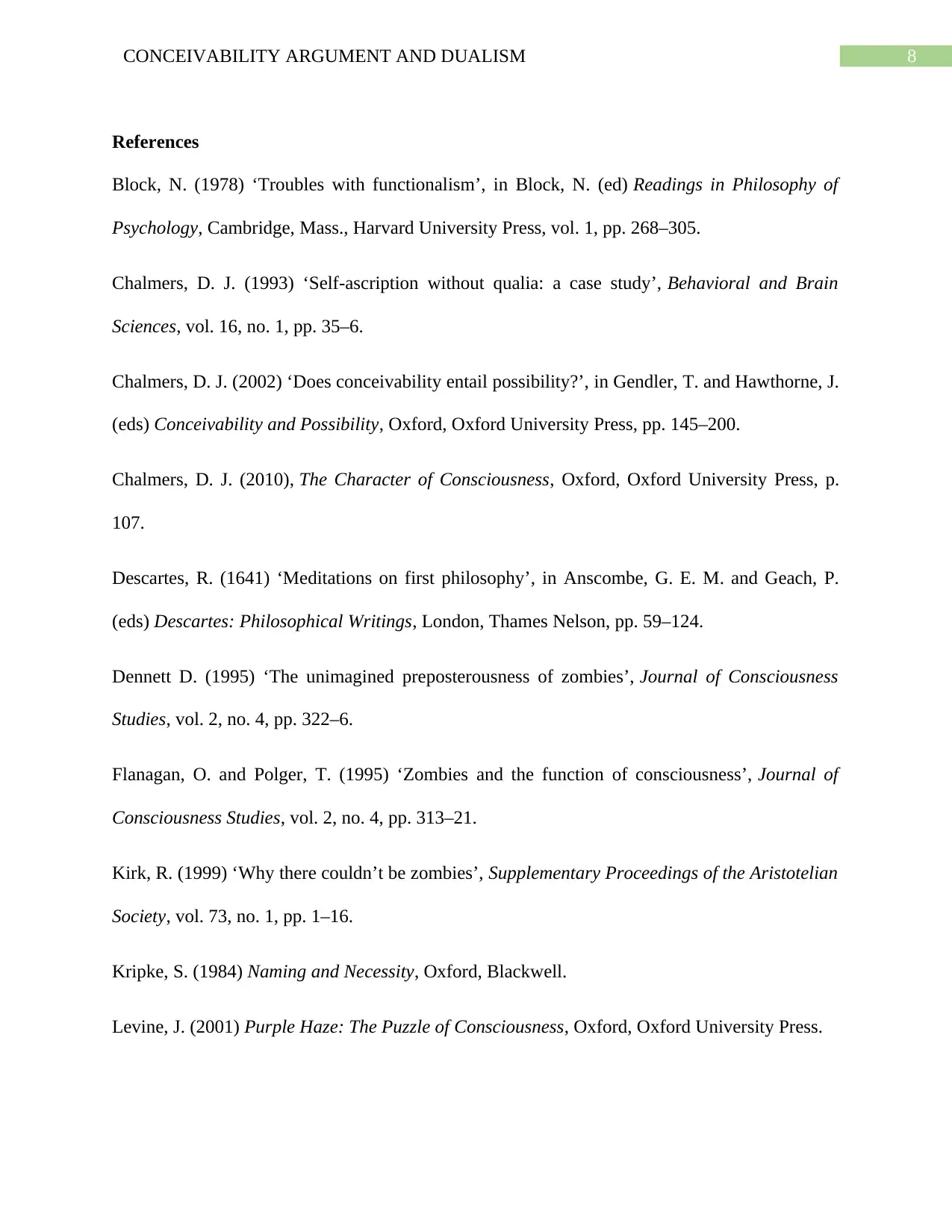
8CONCEIVABILITY ARGUMENT AND DUALISM
References
Block, N. (1978) ‘Troubles with functionalism’, in Block, N. (ed) Readings in Philosophy of
Psychology, Cambridge, Mass., Harvard University Press, vol. 1, pp. 268–305.
Chalmers, D. J. (1993) ‘Self-ascription without qualia: a case study’, Behavioral and Brain
Sciences, vol. 16, no. 1, pp. 35–6.
Chalmers, D. J. (2002) ‘Does conceivability entail possibility?’, in Gendler, T. and Hawthorne, J.
(eds) Conceivability and Possibility, Oxford, Oxford University Press, pp. 145–200.
Chalmers, D. J. (2010), The Character of Consciousness, Oxford, Oxford University Press, p.
107.
Descartes, R. (1641) ‘Meditations on first philosophy’, in Anscombe, G. E. M. and Geach, P.
(eds) Descartes: Philosophical Writings, London, Thames Nelson, pp. 59–124.
Dennett D. (1995) ‘The unimagined preposterousness of zombies’, Journal of Consciousness
Studies, vol. 2, no. 4, pp. 322–6.
Flanagan, O. and Polger, T. (1995) ‘Zombies and the function of consciousness’, Journal of
Consciousness Studies, vol. 2, no. 4, pp. 313–21.
Kirk, R. (1999) ‘Why there couldn’t be zombies’, Supplementary Proceedings of the Aristotelian
Society, vol. 73, no. 1, pp. 1–16.
Kripke, S. (1984) Naming and Necessity, Oxford, Blackwell.
Levine, J. (2001) Purple Haze: The Puzzle of Consciousness, Oxford, Oxford University Press.
References
Block, N. (1978) ‘Troubles with functionalism’, in Block, N. (ed) Readings in Philosophy of
Psychology, Cambridge, Mass., Harvard University Press, vol. 1, pp. 268–305.
Chalmers, D. J. (1993) ‘Self-ascription without qualia: a case study’, Behavioral and Brain
Sciences, vol. 16, no. 1, pp. 35–6.
Chalmers, D. J. (2002) ‘Does conceivability entail possibility?’, in Gendler, T. and Hawthorne, J.
(eds) Conceivability and Possibility, Oxford, Oxford University Press, pp. 145–200.
Chalmers, D. J. (2010), The Character of Consciousness, Oxford, Oxford University Press, p.
107.
Descartes, R. (1641) ‘Meditations on first philosophy’, in Anscombe, G. E. M. and Geach, P.
(eds) Descartes: Philosophical Writings, London, Thames Nelson, pp. 59–124.
Dennett D. (1995) ‘The unimagined preposterousness of zombies’, Journal of Consciousness
Studies, vol. 2, no. 4, pp. 322–6.
Flanagan, O. and Polger, T. (1995) ‘Zombies and the function of consciousness’, Journal of
Consciousness Studies, vol. 2, no. 4, pp. 313–21.
Kirk, R. (1999) ‘Why there couldn’t be zombies’, Supplementary Proceedings of the Aristotelian
Society, vol. 73, no. 1, pp. 1–16.
Kripke, S. (1984) Naming and Necessity, Oxford, Blackwell.
Levine, J. (2001) Purple Haze: The Puzzle of Consciousness, Oxford, Oxford University Press.
⊘ This is a preview!⊘
Do you want full access?
Subscribe today to unlock all pages.

Trusted by 1+ million students worldwide
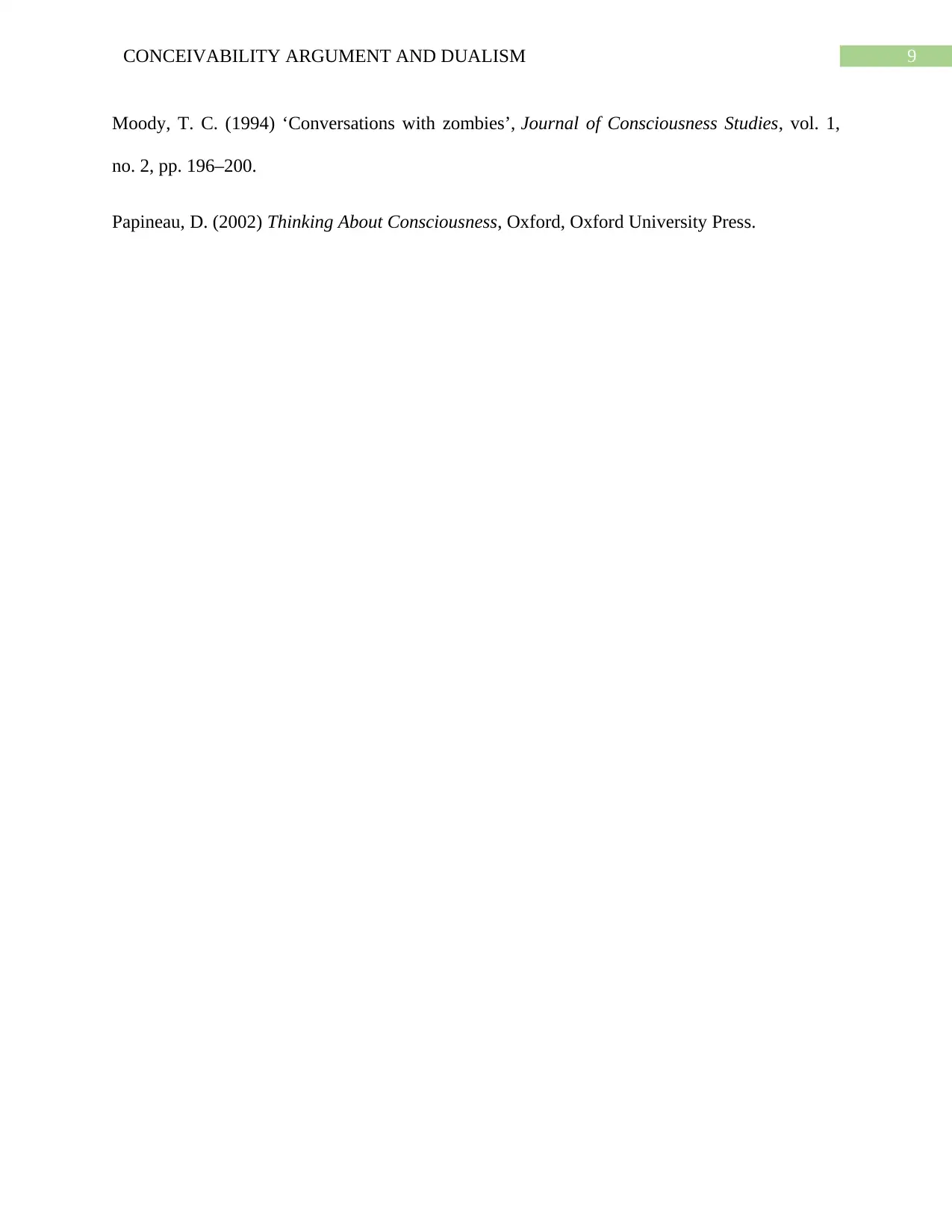
9CONCEIVABILITY ARGUMENT AND DUALISM
Moody, T. C. (1994) ‘Conversations with zombies’, Journal of Consciousness Studies, vol. 1,
no. 2, pp. 196–200.
Papineau, D. (2002) Thinking About Consciousness, Oxford, Oxford University Press.
Moody, T. C. (1994) ‘Conversations with zombies’, Journal of Consciousness Studies, vol. 1,
no. 2, pp. 196–200.
Papineau, D. (2002) Thinking About Consciousness, Oxford, Oxford University Press.
1 out of 10
Related Documents
Your All-in-One AI-Powered Toolkit for Academic Success.
+13062052269
info@desklib.com
Available 24*7 on WhatsApp / Email
![[object Object]](/_next/static/media/star-bottom.7253800d.svg)
Unlock your academic potential
Copyright © 2020–2026 A2Z Services. All Rights Reserved. Developed and managed by ZUCOL.



